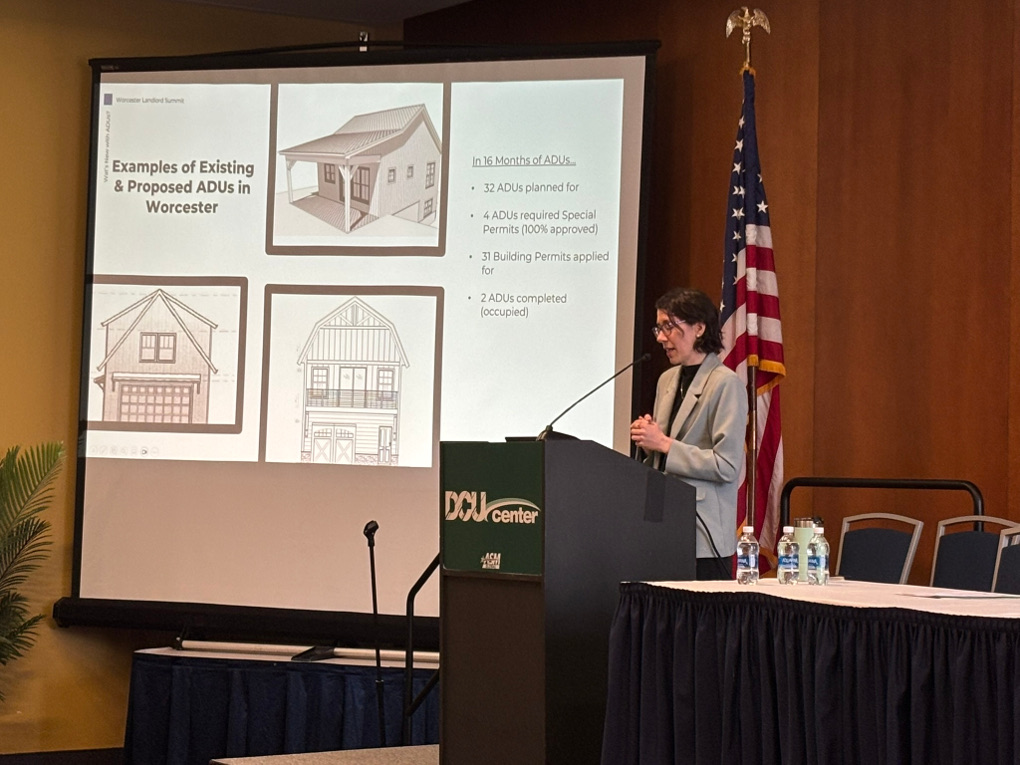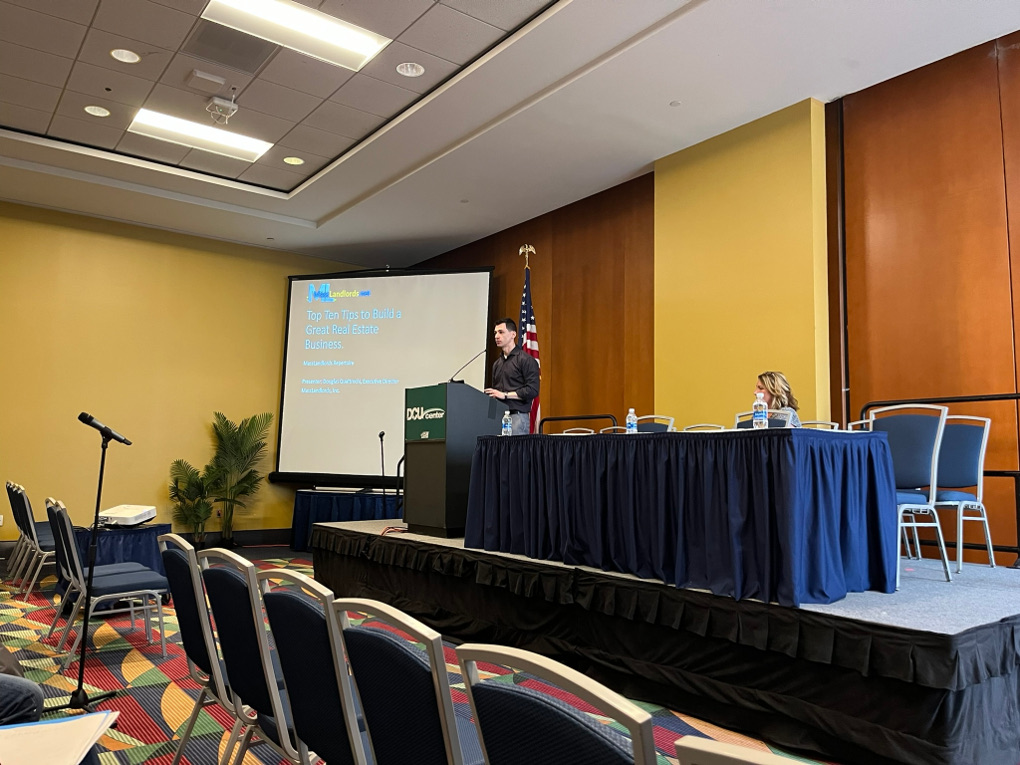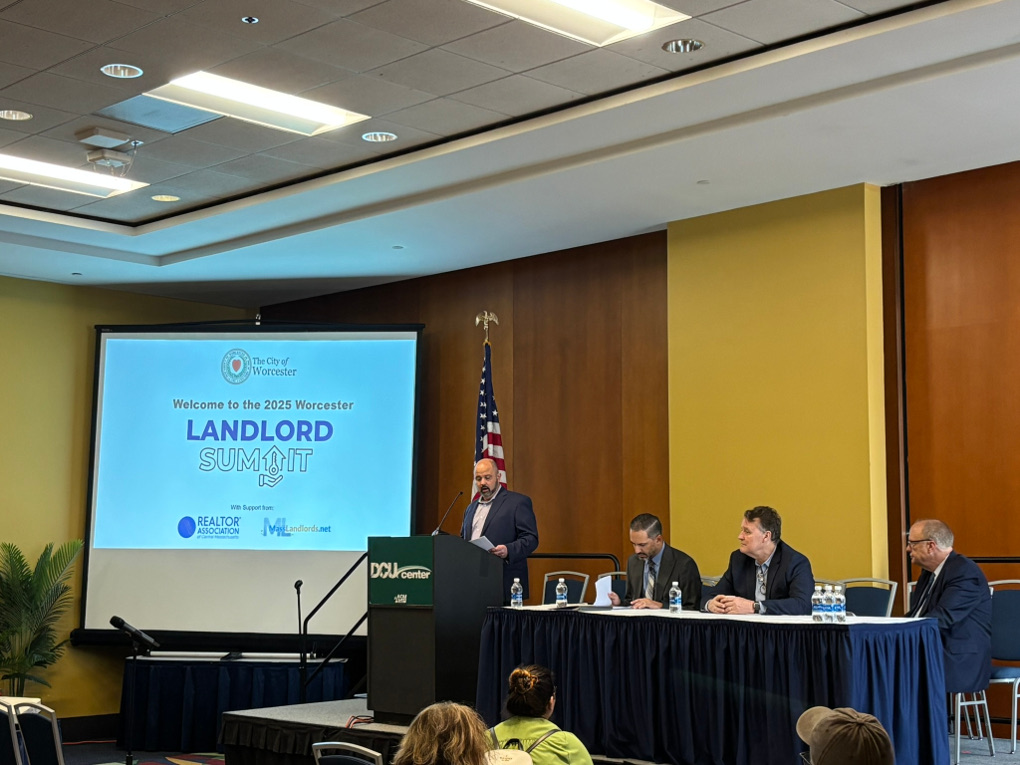Worcester Landlord Summit 2025 Gives Updates on ADUs, Rental Registry
. Posted in News - 0 Comments
The 2025 Worcester Landlord Summit, hosted by the City of Worcester, MassLandlords, and the REALTOR Association of Central Massachusetts, was held May 10 at the DCU Center in Worcester. Approximately 300 attendees came to learn about accessory dwelling units, the rental registry, fire safety, business skills and much more.
Accessory Dwelling Units (ADUs) Do Not Require Special Permit
Under the new regulations enacted earlier this year, all lots on which a single family home could be built have been upzoned to one more unit than otherwise allowed by the town. This means a single can be a duplex, a double can be a triple, and a triple can be four units, in many cases. The extra unit is called an Accessory Dwelling Unit (ADU) and is subject to restrictions, but not too many. It cannot be more than half the gross floor area of the principle dwelling or over 900 square feet, whichever is smaller.

Thanks to the City of Worcester’s support, MassLandlords’ table was the first table after the event registration desk.
ADUs can now be built in the City of Worcester without a special permit, which is typical for how the law is being implemented in other towns, as well. The state forecasts that this law will create 12,000 new units of housing over 10 years.
City Manager Eric Batista opened the event by talking about this change and the challenge of keeping Worcester’s housing stock up to date. He said 59% of the city’s housing is over 50 years old.
At a breakout session later in the morning, Michelle Smith, Assistant Chief Development Officer, gave more information. In Worcester, the following will apply: ADUs require no site plan review under the planning board. The required minimum setback is five feet. They will allow ADUs in multifamily lots. There is no requirement to rent to family members (in other words, the ADU can be used as market rate rental housing).

City of Worcester Assistant Chief Development Officer Michelle Smith presented on Accessory Dwelling Units (ADUs).
Before applying for a construction permit to build an ADU, there must be a new street address. To apply for a street address, there must be a professional land survey and a design for the building that demonstrates compliance with building code.
When pulling the permit, expect the ADU to trigger sprinkler requirements. Rules are site-dependent. A driveway 20 feet wide leading to an ADU within 50 feet of the main building may not trigger a sprinkler requirement; an ADU more than 50 feet away from the street will always require sprinklers. Consult with the building department specifically about sprinklers before pulling the permit and budget accordingly.
The City of Worcester has a $1,650 per bedroom sewer connection fee for a new address. There are no new water or sewer lines connected during the Department of Public Utilities’ winter lockout, so plan ahead.

MassLandlords Executive Director Doug Quattrochi gave a presentation titled Top Ten Tips to Build a Great Real Estate Business.
Rental Registry Inspections Began
The city’s Director of Housing and Health from the Department of Inspectional Services, Lee Hall, gave a presentation on the implementation of the rental registry.
Approximately 10,000 units have been registered in the mandatory Worcester rental registry, allowing the city to start inspections. (As of 2013, there were 78,662 housing units in the city, of which approximately 48,000 were multifamily.) The city is projecting inspections to take one hour per three-unit building. Inspections will be clustered by census block, approximately 100 buildings. Four blocks will be selected each wave: two in the urban core and two in the outskirts. Green Island was selected as the first block to be inspected.

At the end of the event, the MassLandlords table was empty, with attendees having taken the newsletters, tri-fold brochures, pens and flyers.
MassLandlords Editorial Comment on the Worcester Rental Registry
Many of our Worcester members have considered the registry ill-conceived, pointing out that scofflaw landlords do not register. This leaves the city over-inspecting good units and under-inspecting the slumlords. So far, with only 20% of units registered after a year, this seems to be the case.
Further, the $300 per day fine for failure to register will total $9,000 per month, which would amount to a regulatory taking on a unit that might have net next-to-nothing to the owner over the course of a year. Such fines would likely only be levied against a senior or other undercapitalized landlord unable to keep up with changing laws or passed through to renters in the form of increased rent. Non-compliant landlords who keep no equity in their property and cannot be tracked down are unlikely to ever pay. Case law overturning such fines is yet to be established.
Rental registry fees are $5 per annual renewal per unit, totaling $25 every five years. These fees must cover staff costs of transport, inspection and enforcement, plus capital costs of vehicles; the registry is likely to prove a net drain on city resources. All landlords are advised to register and just get through the inspections.
Landlords should be prepared to pass inspection under the new 2023 sanitary code changes, which took effect immediately that year.





